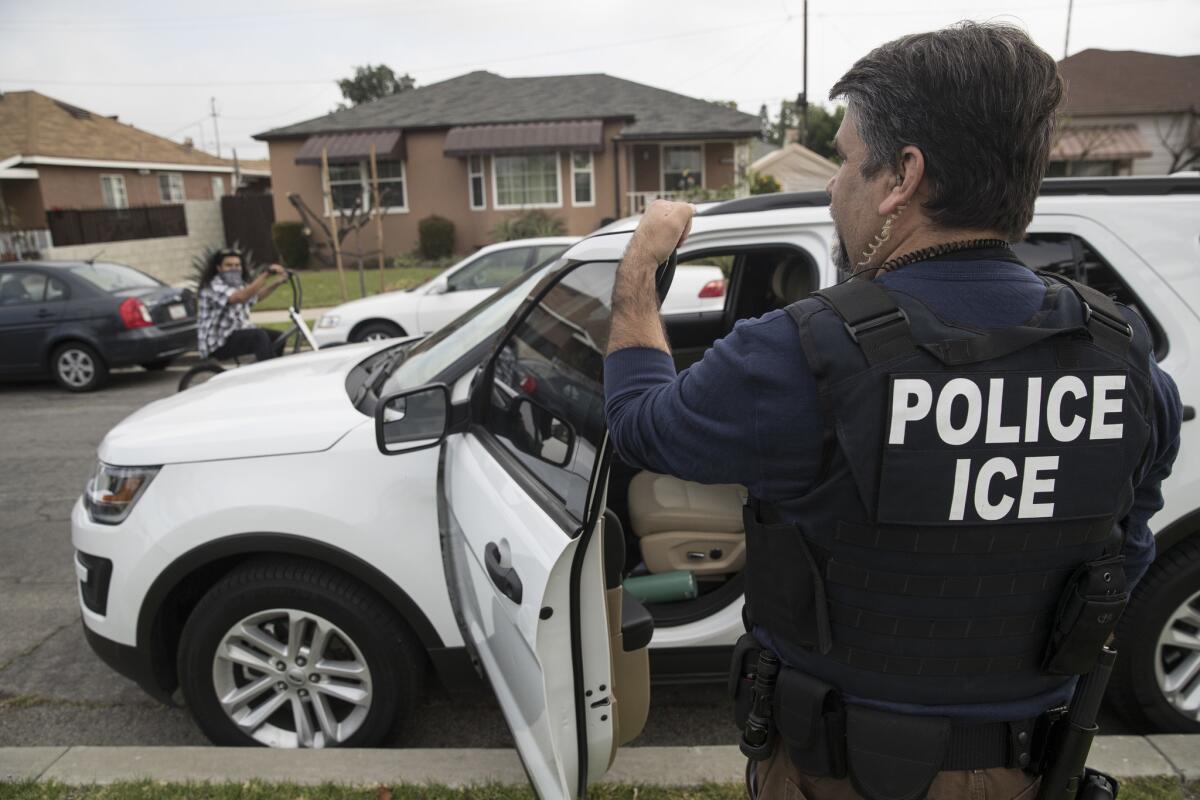ICE arrests over 300 in L.A. area during month-long operation

- Share via
Over the summer, even as the Los Angeles County Sheriff’s Department pulled back from cooperating with Immigration and Customs Enforcement officers, federal immigration agents arrested over 300 people in the area as part of a month-long nationwide operation.
The operation, which ran from July 13 until Aug. 20, focused on those who have been arrested or have pending charges or convictions for crimes against people, according to ICE. That included people convicted of battery, rape and kidnapping, the agency stated.
ICE announced the results of the enforcement operation this week and provided further details in a Friday morning media call.
The operation also resulted in the “collateral arrest” of a 45-year-old Mexican citizen who was not on the target list and had no criminal record, according to David Marin, the director of Enforcement and Removal Operations for ICE in L.A. That individual, who was driving with someone who had a pending domestic violence charge, was released on an order of recognizance.
Of those arrested locally, over 100 have been deported, according to ICE. Officers arrested people from 22 countries; 13 of those arrested were women.
Nationwide, ICE officers arrested more than 2,000 people.
“Our officers have continued targeted enforcement operations throughout the ongoing COVID-19 pandemic, while incorporating appropriate procedures to safely and effectively perform missions that ensure public safety,” Marin said during the call.
The agency came under fire nationwide in March for continuing to make arrests as states went on lockdown due to the pandemic, and ordered residents to shelter at home. That same month, ICE said it would shift its focus to “public safety risks.”
ICE made about 65% fewer arrests in the L.A. area in April than it did in March, according to the agency. ICE recorded 230 arrests in March, compared with approximately 80 arrests in April.
During operations, officers are using protective equipment, such as masks, gloves and face shields, which they also provide to detainees, according to Marin. Marin said he is unaware of any officers in the L.A. area who have contracted COVID-19 as a result of field operations.
Nearly 30% of the recent arrests were of people with previously non-honored detainers, making them eligible to be transferred over to federal custody, according to Marin. The highest number of declined detainers, he said, came from the L..A. County Sheriff’s Department and the LAPD.
“This highlights the dangers associated with non-cooperation among law enforcement, driven by misguided policies that often place politics ahead of public safety,” Marin said.
When Alex Villanueva became sheriff, he limited the criteria that allow inmates to be transferred to federal custody for possible detention or deportation. Villanueva said that ICE transfers declined by 52% in 2019.
Last month, Villanueva took it a step further and announced that the department would not transfer inmates to the custody of ICE based solely on a civil immigration detainer.
This week, the L.A. County Board of Supervisors approved a motion that would adopt the ban as permanent policy countywide. It prohibits the use of county resources for these transfers without a judicial warrant.
“It is the right time to end this jail-to-deportation pipeline,” Supervisor Hilda Solis, who co-authored the motion, said in a statement. “We have a moral and constitutional obligation to stop transferring people to ICE custody during this pandemic and long after it is over.”
Henry Lucero, ICE’s executive associate director for Enforcement and Removal Operations in Washington, called the permanent ban on transfers a “mind-boggling decision.” He added that obtaining a judicial warrant “is not a possibility.”
“There’s no judge in this country that has the authority to issue a warrant for civil immigration violations,” Lucero said. “The idea that ICE should even seek a judicial warrant from an already overburdened federal court before taking custody of aliens on civil immigration violations was just created for those who wish to undermine immigration enforcement.”
More to Read
Sign up for Essential California
The most important California stories and recommendations in your inbox every morning.
You may occasionally receive promotional content from the Los Angeles Times.














